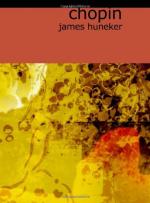Now Chopin’s father was not a musician, neither was his mother. I cannot trace Grembeki, but we know that the Countess Skarbek, mother of Chopin’s namesake, was not a musician; however, the title “musician” in the baptismal certificate may have signified something eulogistic at that time. Besides, the Polish clergy was not a particularly accurate class. But Janotha has more testimony: in her controversy with me in 1896 she quoted Father Bielawski, the present cure of Brochow parish church of Zelazowa-Wola; this reverend person consulted records and gave as his opinion that 1810 is authentic. Nevertheless, the biography of Wojcicki and the statement of the Chopin family contradict him. And so the case stands. Janotha continues firm in her belief although authorities do not justify her position.
All this petty pother arose since Niecks’ comprehensive biography appeared. So sure was he of his facts that he disposed of the pseudo-date in one footnote. Perhaps the composer was to blame; artists, male as well as female, have been known to make themselves younger in years by conveniently forgetting their birthdate, or by attributing the error to carelessness in the registry of dates. Surely the Chopin family could not have been mistaken in such an important matter! Regarding Chopin’s ancestry there is still a moiety of doubt. His father was born August 17, 1770—the same year as Beethoven—at Nancy, Lorraine. Some claim that he had Polish blood in his veins. Szulc claims that he was the natural son of a Polish nobleman, who followed King Stanislas Leszcinski to Lorraine, dropping the Szopen, or Szop, for the more Gallic Chopin. When Frederic went to Paris, he in turn changed the name from Szopen to Chopin, which is common in France.
Chopin’s father emigrated to Warsaw in 1787—enticed by the offer of a compatriot there in the tobacco business—and was the traditional Frenchman of his time, well-bred, agreeable and more than usually cultivated.




